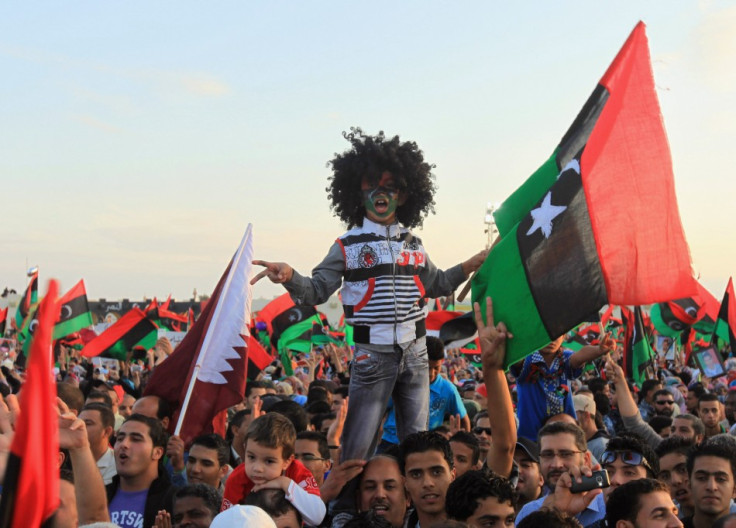Gaddafi’s Death, Liberated Libya and Sharia Law

Gaddafi's death symbolises the beginning of a new Libya, its leaders have said, announcing the Liberation of the country, but with the circumstances in which the former leader died still unclear and accusations of violations of human rights throughout the conflict, Libya it seems is still a long way from democracy.
On Sunday, National Transitional Council leader Mustafa Abdul Jalil made a national declaration of liberation, with officials telling the jubilant crowd in Benghazi, the birthplace of the anti-Gaddafi revolt, "Libyans you are free."
"Today, we begin preparing for a new phase... the phase after the liberation, the phase that we will plan and work hard for the future of Libya," said Abdel Hafiz Ghoga, vice chairman of the National Transitional Council.
"Let us start work on the adoption of the constitution," he also said.
"Declaration of liberation. Raise your head high. You are a free Libyan," Ghoga told the crowd, which echoed him by chanting "You are a free Libyan."
With the country now officially '"liberated", the NTC is expected to implement its roadmap, which include the formation of an interim government within a month and elections for a constituent assembly to draft a new basic law held within eight months.
Parliamentary and presidential elections would then be held within 20 months.
During the address, Abdel Jalil thanked NATO and regional allies for their roles in ousting Gaddafi, and paid tributes to those who lost their lives fighting the Gaddafi regime.
With a country still divided after nine months of conflicts, the leader emphasised that reconciliation should now be the priority.
"I call on everyone to remove hatred from their hearts... it is essential to build Libya," he added.
The aftermath of the "liberation" is set to be difficult, and with the controversy surrounding the death of Colonel Gaddafi, many fear violence can still be on the cards.
Despite the ousting and death of the former leader, his supporters are still in Libya, along with members of his tribe, and with the international community already calling for an investigation surrounding the circumstances of Gaddafi's death, the new regime will have to ensure the security of former Gaddafi supporters.
Throughout the conflict, people from Gaddafi's tribe, particularly those sharing his surname, a common name in Libya, have repeatedly accused the Libyan fighters of persecution, and after years of oppression in the hand of the Gaddafi regime, resentment might take more than just a few months to die down.
During Sunday's celebrations, Mustafa Abdel Jalil also confirmed that sharia law will prevail in liberated Libya.
"As an Islamic country, we adopted sharia as the principal law," Abdel Jalil told the swarming crowds in Benghazi.
"Any law that violates sharia is null and void legally," he said.
The formation of a new government was expected to take "from one week to one month," according to Jalil's earlier comments.
"There are consultations to form a new government and this process would take approximately from one week to one month. It might take longer and or less," he told reporters at the World Economic Forum in Jordan.
"Then there will be real hard work to minimize the period to have elections to elect our national congress, which would be the new parliament instead of the NTC which is going to be dissolved" he added.
The new Libyan leaders have decided to continue using Sahari'a law as the main basis for the country's judicial system, but insisted they will also aim at building a democratic state.
The NTC's vision of an Islamic based and democratic society is not new in the Arab world but has proven difficult to establish. The announcement of sharia law as a prerequisite for the new Libya, ahead of planned elections also shows the limit of the NTC's openness.
Also, while the death of Gaddafi has led the UN and other members of the international community to call for an investigation, the NTC seems less affected by how the former leader died.
Abdel Jalil told Al-Jazeera said that an investigation was being conducted into the circumstances of Gaddafi's killing, saying "We are dealing with the subject with transparency," but human rights advocate have already claimed the investigation should be independent.
NTC fighters have also been accused of violating the human rights of many sub-Saharan migrants by imprisoning them on assumption they were mercenaries, despite no proof of their involvement with the Gaddafi forces.
While reconciliation is a key element that will allow Libya to move on and start its state building process, the respect of domestic but also international law should also be amongst the new regime's priorities. Libya's new transitional government will have to temper tensions that are running high and threaten to destabilise the country, but the nine months of conflicts and their consequences can not just be brushed aside.
In the long run it is impossible to know which party will be elected at the head of Libya's new government and which direction will the leaders of the "liberated" Libya take.
© Copyright IBTimes 2025. All rights reserved.




















